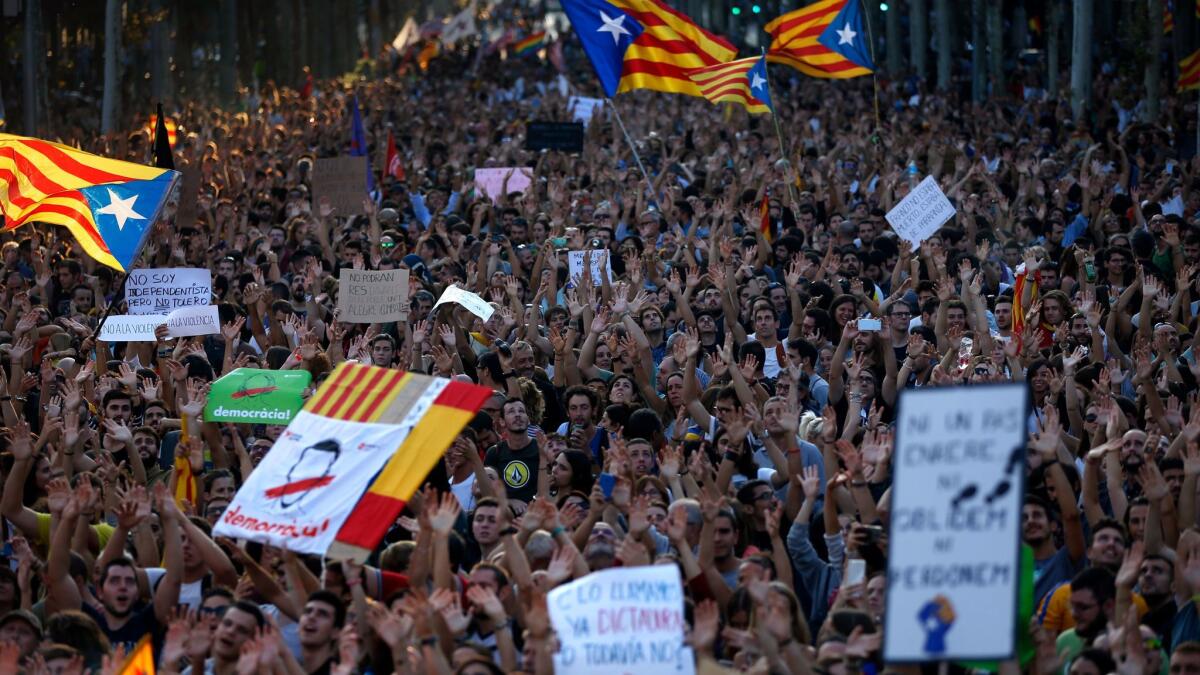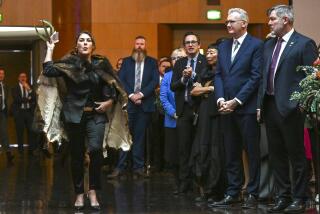Spain’s king says Catalonia leaders pushing independence show ‘inadmissable disloyalty’

Reporting from Barcelona, Spain — Spain’s King Felipe VI on Tuesday accused authorities in the northeast region of Catalonia of disloyalty to the state in what he called their unacceptable push for independence.
“Certain authorities in Catalonia have repeatedly, consciously and deliberately not complied with the constitution,” the king said in a rare televised speech to the nation. “They have systematically violated legally and legitimately approved rules, showing an inadmissible disloyalty toward the powers of the state.
“Their irresponsible behavior might even put the economic and social stability of Catalonia and all of Spain at risk,” he said in the six-minute speech.
The king did not specify what penalties leaders in Catalonia might face for seeking independence from Spain.
Moments after the king’s comments, Catalans emerged on balconies across the regional capital, Barcelona, clanging pots and pans in a chorus of dissent. Earlier, thousands of demonstrators, many of them favoring secession and opposing violence, marched in downtown Barcelona.
Spain is facing its most serious constitutional crisis since its modern democracy began in the late 1970s. In a referendum on Catalan independence Sunday, about 90% of the nearly 2.3 million votes cast were in favor, and about 8% were against, according to the Catalan regional government. The government of Prime Minister Mariano Rajoy considers the referendum illegal.
Some Catalans resent having their taxes subsidize poorer parts of Spain and have long lobbied for more fiscal autonomy from Madrid.
The region of about 7.5 million residents has its own language and culture, which were repressed during the nearly 40-year dictatorship of Gen. Francisco Franco, who died in 1975. Since then the region has become a powerhouse, making up 20% of the Spanish economy, with the tourist hub Barcelona as its capital.
The current king’s father, Juan Carlos, who abdicated in 2014 in favor of Felipe, gave a seminal speech about Spanish unity in 1981. He is credited with putting down a coup attempt in parliament, and saving Spain’s young democracy.
Felipe’s speech came near the end of a day of defiant independence rallies in Catalonia.
Activists blocked dozens of roads into Barcelona to protest their treatment Sunday by Spanish police. Nearly 900 people were injured when national police and Civil Guards raided polling stations during an independence vote the Spanish government and courts had ruled illegal.
Offices, schools and most public transit were closed Tuesday. On the main AP-7 coastal highway, youths unfolded tables and played chess in the road. Farmers drove dozens of tractors onto main roads, at a snail’s pace. Traffic jams stretched toward the French border.
“We are frustrated. We were attacked because we were trying to vote,” said Enric Camarero, 24, whose Barcelona university was closed.
Catalonia leaders and many residents have said the 28-nation European Union should send mediators to Catalonia, but the bloc has mostly fallen in line with the Spanish government.
“The European Union could change things, but they are not. They must know that fundamental rights have been trampled. [Spanish police] crossed red lines,” Camarero said.
Thousands of people converged in front of a national police building in Barcelona, waving ballot papers and Catalan separatist flags. A 10-foot banner held above the crowd read, in English: “893 injured. What else do you need, Europe?”
Catalonia’s president, Carles Puigdemont, said the region is expected to declare independence from Spain within days. A regional law passed last month requires such a declaration to come 48 hours after the certification of referendum results. That certification has not yet been made public.
Some of those who voted Sunday for independence said they nevertheless opposed an immediate, unilateral declaration.
“I don’t even know what it means to declare independence yourself, from one side,” said Amaya Carrillo, 30, a computer science engineer originally from the neighboring Basque Country, which has its own separatist movement, with a violent history. “You need people to recognize you. You need to work things out. So I don’t think it’s that easy.”
According to the 1978 constitution, the Spanish king’s role is largely ceremonial. He usually addresses the nation only on Christmas, and rarely gets involved in politics.
On Tuesday, King Felipe’s speech did not mention the violence two days earlier between Spanish police and Catalan voters. His tone was stern and scolding, but he also urged unity and spoke at one point directly to Catalan residents:
“In constitutional and democratic Spain, you know you have a space for harmony and meeting with your fellow citizens,” he said.
Frayer is a special correspondent.
More to Read
Sign up for Essential California
The most important California stories and recommendations in your inbox every morning.
You may occasionally receive promotional content from the Los Angeles Times.










